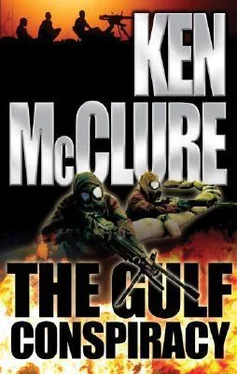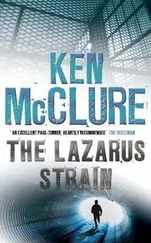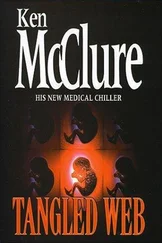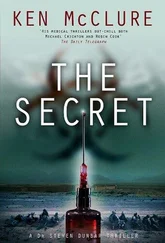The minister shook his head. ‘Oh, I suppose not,’ he sighed. ‘Ask Jeffrey if he’ll go along. Get him to assure them that we are looking at the situation in great detail and seeking the best medical advice available. The welfare of our troops is our primary concern, you know the sort of stuff. Jeffrey knows the form.’
‘Yes sir.’
As the secretary left the room, the minister took out a file from his desk and flipped it open. It was headed, Top Secret, Gulf War Syndrome .
Channing House
Kent, England
18 Sept. 1991
‘England in the autumn, eh Warner? Our England. Who’d want to be anywhere else?’ said Sir James Gardiner. He was looking down from the bay window of a first floor room at the trees in the garden. ‘Season of mists and mellow fruitfulness and all that. So sad, don’t you think? Another year of our lives gone, but with such a beautiful requiem.’
Warner grunted his agreement. ‘If only more people realised it. Maybe they’d be less inclined to sit back and let the country go to the dogs.’
‘With a bit of luck our success in the Gulf War might put some backbone into them,’ said Gardiner.
A bonfire of leaves, lit in the early afternoon, was still smouldering and sending tendrils of smoke up into the still evening air. The smell of burning leaves was everywhere.
‘Let’s join the others,’ said Gardiner.
As was usual at such meetings, Gardiner took his place at the head of the table.
‘I thought it best we meet in view of the press coverage being given to something I understand is being called Gulf War Syndrome,’ said Gardiner. ‘Does this have anything to do with what happened at Porton a year ago? And if so, just how much of a problem we can expect?’
The question was addressed to Dr Donald Crowe, leader of the Beta Team at Porton Down Defence Establishment.
‘I think we have to face the fact that the accident may have something to do with it,’ said Crowe. ‘But there are a great number of other factors to be considered which, if I may so, tend to work in our favour.’
‘Explain.’
‘Veterans of the war have apparently been coming down with a wide range of symptoms.’ He read from his notes. ‘Chronic fatigue, intermittent fever, night sweats, headaches, skin rashes, abdominal bloating, diarrhoea and so it goes on: the list seems endless. This in itself should prevent these symptoms from ever being assigned to any one particular condition.’
‘But in reality, all these things are due to contamination of the vaccine?’ asked Gardiner.
‘Far from it,’ replied Crowe. ‘Saddam did us a favour with his primitive attempts to use CB weapons in the war. Inadvertently and most obligingly, he created a very convenient smoke screen.’
‘You mean that some of the illness may be due to the effects of these weapons rather than our agent?’
‘Almost certainly.’
Gardiner appeared to relax a little and others took their cue from him.
‘Our American friends also did their bit by not being entirely explicit about the use of PB as an antidote to nerve gas attack,’ said Cecil Mowbray. The speaker was a dapper man in his early fifties, whose intelligent but cold eyes and propensity to listen rather than speak in company marked him out as a natural for a career in intelligence. He had worked for MI5 for some twenty-five years, ever since leaving Cambridge with a First in classics. ‘Quite a number of forces personnel suffered the effects of over-dosing and unfortunately a small number suffered the combined effects of Sarin gas and PB ingestion.’
‘More smoke,’ said Warner.
‘It’s a pity of course, that the Iraqi use of CB weapons can’t be made public,’ said Crowe. ‘For obvious reasons.’
‘There’s public and then there’s public,’ said Warner. ‘Rumour was rife in the Gulf. The tales of conspiracy and cover-up that our dear friends in the media are so fond of will keep them chasing their tails rather than come sniffing at anything closer to home.’
‘I anticipate the fact that the Americans supplied Saddam with these weapons will become public knowledge over the next few years but, by that time, the war will be something of a distant memory in public consciousness and therefore this will not be such an issue,’ said Mowbray.
‘You seem to be suggesting that we have nothing to fear from Press interest in this Gulf War Syndrome thing and that we’re in the clear?’ said Gardiner.
‘I believe that to be the case,’ said Mowbray.
‘I agree,’ said Crowe.
‘I’m not sure that congratulations are in order, Crowe: this should never have happened in the first place, but I suppose it could have turned out much worse. I take it that none of the personnel affected by the accident will suffer any long-lasting effects?’
There was a long pause before Crowe, picking his words carefully, said, ‘We would sincerely hope not, Sir James. It was a very early version of what we were working on so we didn’t assess it in any great detail at the time but I really think we can put this affair behind us.’
‘Good. All’s well that ends well eh? I take it no embarrassing questions were ever asked at Porton and you cleaned up behind you, so to speak?’
Crowe cleared his throat as if taken by surprise by the question. ‘The project was abandoned and everything destroyed as you directed,’ he said. ‘No questions were asked.’
‘What about the people on your team?’ asked Gardiner.
‘Dr Sebring had great difficulty in coming to terms with the accident. He felt responsible — as indeed he was.
Gardiner diverted his eyes momentarily from Crowe to hide his distaste at Crowe once again distancing himself from blame.
‘He had to seek medical help,’ Crowe continued. ‘He was on sick leave for some considerable time and when he eventually did return he decided that he no longer wanted to do the same kind of work and left our employ. It was probably for the best really.’
‘And the others?’
‘One other man left; the remaining two have been reassigned to different projects.’
‘I take it they all understood the full implications of the Official Secrets Act?’
Crowe was about to offer assurances when Mowbray interrupted. ‘I don’t think we need have any worries on that score. Low-level surveillance has been kept on them ever since the break-up but everything seems fine. Sebring has been taken on as a lecturer at the University of Leicester. Michael D’Arcy is currently employed by a pharmaceutical company here in Kent while Lowry and Rawlings are, of course, still at Porton.’
‘Working on malaria,’ added Crowe.
‘Good,’ said Gardiner.
‘Obviously, there may be financial implications for HMG if the numbers of sick veterans continues to grow,’ said Rupert Everly, adopting his grave concern expression. ‘That in itself might well keep this so-called Gulf War Syndrome in the public eye.’
‘Cries for compensation, you mean?’ said Gardiner sourly. ‘Let’s hope HMG takes a strong line on that. Give it to one and they’ll all be after something for nothing.’
‘Come, that’s a bit harsh, James,’ said Warner. ‘After all that went on in the Gulf, some of these soldiers are genuinely ill.’
‘The state already makes provision for people who are genuinely ill,’ retorted Gardiner. ‘There’s no need to recognise a whole new syndrome, especially one that doesn’t actually exist. When you take the Queen’s shilling, you take your chances. That’s the way it’s always been.’
‘When the guns begin to shoot, my lad, when the guns begin to shoot,’ said Warner. ‘Mind you,’ he added, smoothing his moustache with thumb and forefinger, ‘We usually just had to fight the other side...’
Читать дальше












